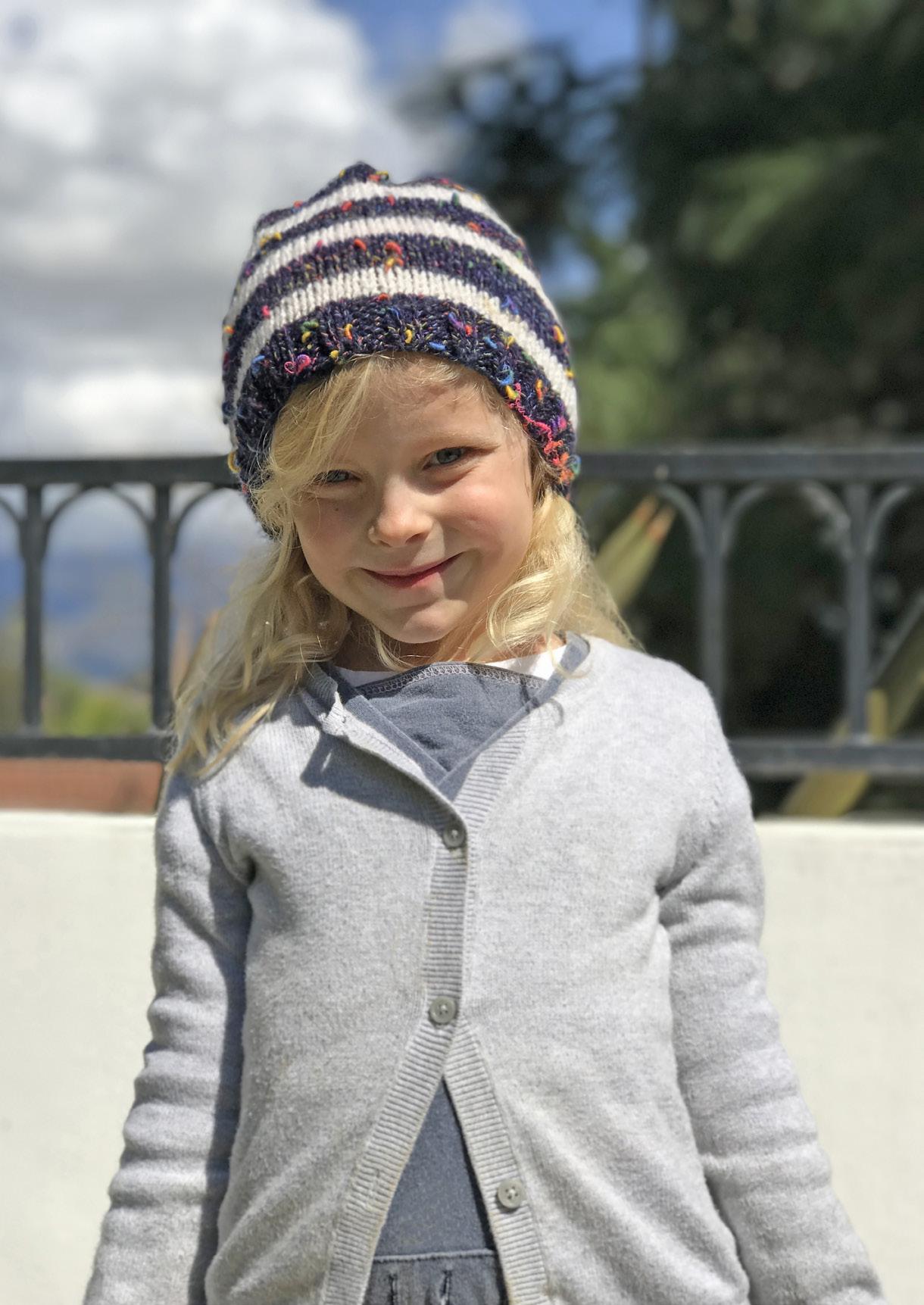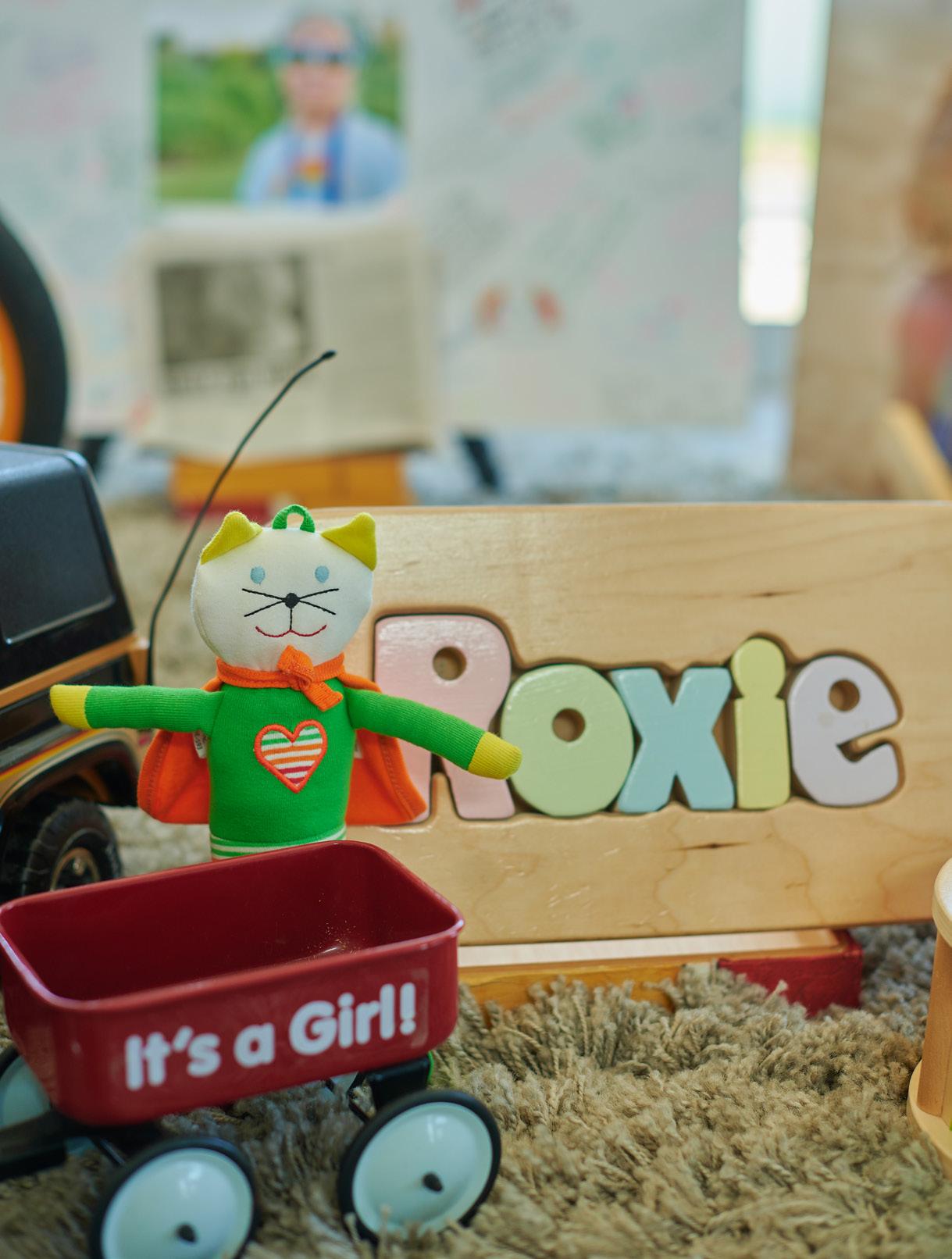
16 minute read
KIDS DON’T DROWN THEMSELVES
Roxie Forbes suffered from CVID, common variable immunodeficiency, a disorder that impairs the immune system. People with CVID are highly susceptible to infection from foreign invaders such as bacteria or, more rarely, viruses and often develop recurrent infections, particularly in the lungs, sinuses and ears.
Photo courtesy Doug Forbes

ROXIE FORBES’ PARENTS STAND UP FOR THEIR CHILD AND OTHERS BY CHRISTINA FUOCO-KARASINSKI
Roxie Forbes was the center of Doug Forbes and Elena Matyas’ universe. Some would say she still is.
This month marks the one-year anniversary of the 6-year-old Pasadena girl’s death. She drowned at the Summerkids Camp in Altadena on June 28, 2019.
“It took me 41 years to bring a child into the world,” Matyas says. “She was everything we could have asked for and more. She was a wonderful, compassionate bright light. Her kindergarten teacher recently said to me the mold was broken after Roxie was made.”
Before the COVID-19 pandemic and quarantine, on February 10, Forbes and Matyas paired with state Sen. Anthony Portantino, D-La Cañada Flintridge, to introduce legislation— SB 955, the Roxie Rules Act—that aims to provide more oversight of California summer camps.
“Everything is on hold because of COVID-19, but it’s a robust bill,” Forbes says.
In researching camp safety issues, Forbes and Matyas discovered that more than a million children attend thousands of California camps and these camps are largely unregulated. Summerkids Camp, according to the LA County Department of Public Health, did not have an operating license. (It will not hold camp this summer due to COVID-19, per a statement on its website.)
“As a father myself, I cannot begin to comprehend what has happened to the Forbes family,” Portantino says.
“Losing a child is the single worst thing that can happen to a parent. It hurts even more because we know that this was a preventable tragedy. I am very grateful that Roxie’s family is channeling their tremendous grief to make sure that tragedies such as this do not happen again. I want to commend them for all the work they have done to raise awareness and knowledge of the gaps in state law regarding recreational camps.”
Thirty-eight states—but not California—have some sort of statewide camp regulations. This bill will correct this omission in state law and bring camps in line with other regulated services such as day care facilities, Forbes says.
“We subsequently discovered that the vast majority of California summer day camps do not have child care licenses because the state and the counties do not require them to have such licenses,” Forbes adds.
“Overnight camps are required to have licenses, but the inspections and oversight for all camps are woefully inadequate. Multiple children have died over the last decade; more have been victims of sexual predating and other issues.”
The Roxie Rules bill requires camps employ more health and safety measures, including background checks, emergency action plans, mandated reporter training and implementation, health and aquatics supervisors, proper safety certifications for rifle ranges, ziplining, horseback, aquatics, rock climbing and other activities.
The couple established the nonprofit Meow Meow Foundation—named after Roxie’s feline comfort doll—to educate the public about this oversight.
The couple is developing California’s first end-to-end drowning prevention solution, and they’re suing DiMassa for wrongful death.
“We’re trying to be as careful as we can be,” Forbes says. “Not because of the lawsuit, but when you have a child die in a wholly preventable circumstance, a child care facility should take a step back, take a deep breath and say, ‘Wow.’”
Matyas adds, “Drowning is the second leading cause of death for 0- to 4-year-old children.
“It was stunning when we found that out as well. We are going to create the state’s first endto-end drowning prevention solution. It’s going to describe the best swim lesson regimen, the best pool safety gear and swim safety gear, the best pool fence alarms, and life jackets. We’re putting together the curriculum so it can be taught in schools—public and private.”

Elena Matyas and her husband, Doug Forbes, say Roxie Forbes was their world. After her death, they founded the Meow Meow Foundation.
Beloved
Roxie suffered from CVID, common variable immunodeficiency, a disorder that impairs the immune system. People with CVID are highly susceptible to infection from foreign invaders such as bacteria or, more rarely, viruses and often develop recurrent infections, particularly in the lungs, sinuses and ears.
“There are only 60,000 reported cases of CVID in all the United States,” Matyas says. “It’s very rare, and Roxie was diagnosed early.”
Forbes adds, “Her (genetic) mutation is the only one of its kind in the world.”
Roxie had a relatively normal infanthood, until around age 2, when she developed her first strep throat and pneumonia. Over an 18-month stretch, she suffered eight to 10 bouts of documented pneumonia.
Roxie was treated at home, where she received human adult antibodies each week, as directed through Children’s Hospital Los Angeles.
“She was the most normal-looking, running, jumping, happy kid,” he says. “You would never know.”
Roxie attended San Rafael Elementary School, where she took Spanish immersion classes, ballet and swim lessons. She once met a boy with an overactive immune system. Roxie had a nonreactive immune system.
The boy’s mother asked if Roxie could sit with him at the allergy table.
“She not only said yes, she never left his side for the entire year,” Matyas recalls. “It was truly fascinating to watch. The world lost a good one.”
Forbes adds, “We’re not just parents doting on a deceased child. What she did in her life was pretty extraordinary. If a child fell on the playground or was alone in the park, she was the kid who would put her arm around the child to make them feel comfortable.”
Lies?
Roxie went to Summerkids for 10 days, and on her last day, she had a little cold. Her parents dropped her off, told her they loved her and walked away. Last summer was her first camp experience.
The next time they saw her, she was on life support at Children’s Hospital Los Angeles.
“No parent should have to receive the message we had,” Forbes says. “We rushed to the hospital and she was dead. Her eyes were half open. Her brain had long since died. We removed her from life support equipment the following day at Children’s Hospital.”
Forbes says Summerkids’ owner/operator, Cara DiMassa, showed up at the hospital unannounced and unwelcome and was disruptive. She abruptly left when she found out Roxie died, Matyas adds.
Afterward, Forbes says DiMassa “lied to the greater Los Angeles community about the cause of death and the circumstances that led to Roxie’s death.”
DiMassa says Roxie had a medical event, such as a heart attack, that led to an immediate death—not drowning. However, Forbes says the coroner clarified the cause of death—drowning or “near drowning,” “which only means that Roxie’s heart was restarted after 40 minutes, even though she had long since died.”
“All first-responder reports and other medical reports proved Roxie’s heart and organs were fine and did not cause any medical event,” Forbes adds.
Various documents—emails and first-responders’ reports—say the camp and pool staff looked away between 10 seconds and 5 minutes before Roxie was found face down floating in the pool. Three counselors admitted to running away from the scene after Roxie died, Forbes adds.
Forbes says DiMassa told parents via email not to pick up their children early the day Roxie died because she wanted to keep the day as normal as possible.
DiMassa sent a series of emails, according to Forbes, that were “rather shockingly full of lies.” The DiMassas said Roxie’s parents shouldn’t be contacted and only the camp would receive flowers, food and sympathy cards.
“It’s the classic, ‘Shut down the communication. We don’t want anybody to know about it,’” he recalls. “They still held on to our $3,000 until we screamed for it. They wouldn’t give us our money back. We had to ask for it five times.”
The Department of Social Services found DiMassa was operating Summerkids illegally, Forbes adds. Because DiMassa defied the ruling and continued to operate, the state’s attorney general and the Department of Social Services filed a complaint for injunctive relief to shut down Summerkids until it receives the proper licensing.
“For the children who were campers and the children who worked there—they
were age 15 to college graduates—the DiMassa family was supposed to serve as role models,” Matyas says.
“When you allow a child to die and your response to that is, ‘It’s not our fault and there’s nothing we could have done differently,’ that doesn’t help anybody become a better human. They have to learn about responsibility or consequence of action. It hurts so very bad. It’s 11 months later and I have not heard ‘I’m sorry’ or ‘Roxy was a really sweet girl.’
“There has been zero outreach from anyone involved with Summerkids. They shut us out from communications, and that makes our loss even more painful. These people care about their reputation more than a 6-year-old girl who died in their pool.”
One of DiMassa’s attorneys responded to an email to her by Arroyo Monthly. Steve Madison represents the regulatory litigation with the state attorney general. (A separate attorney, who did not return messages for comment, represents DiMassa in the civil suit.)
“Summerkids once again extends its deepest condolences to Roxie’s family,” Madison says. “This was a tragic accident. There were four certified lifeguards on duty that day. The sheriff ruled this was accidental. There are issues that will be litigated in the wrongful death suit that the family is bringing. I can’t comment more than that.”
In terms of the legislation, Madison says, it’s “apparent to many people that the state law and county code are a bit confusing and arguably ambiguous.”
Summerkids has operated for 42 years and is a member of the American Camping Association.
“We read the state law as clearly allowing day camps of the kind most of us are familiar with as operating that way—not as a child day care center, such as a preschool or nursery school,” he says.
“Certainly, that legislation has been referred to three separate committees before the pandemic. There remains quite a bit of work that needs to be done on it.”
The future
Forbes and Matyas are concerned for future campers—many of whom may be in harm’s way.
“When we were in the hospital looking over our dead daughter, we were still concerned about the hundreds of other children at the camp who were unattended,” Forbes says.
The couple just wants what’s best for other children who attend any sort of day camp, not just Summerkids.
“They’re ziplining over tree canopies, horseback riding and swimming,” he says. “None of these activities are regulated.
“Also, do they require background checks for campers or staffers? I know some of them have hired sexual predators. That’s what happened many, many, many, many times. I’ve heard lots of stories of sexual predators and rapes at camps. Nobody is going to know the wiser. How can you run a camp without an emergency action plan? Camps do not have plans to contend with fires, flooding or earthquakes. That’s frightening.”
In a letter to Gov. Gavin Newsom, the couple says a handful of day and resident (overnight) camps are expected to be open. Those include Tom Sawyer Camp and Camp Adventurewood in Pasadena. Matyas and Forbes are concerned for the campers’ safety. Will the parents know if there’s, say, a COVID-19 outbreak there?
The Meow Meow Foundation, they say, isn’t trying to be “merely alarmist.”
“We implore you and the CDC to include day and resident camps as nonessential businesses in all future virus-related directives until detailed social guidelines are established,” they continue. “We also encourage you to meet with us to discuss ways by which camps can implement more effective health measures.”
The American Camp Association and its lobbyists have a long history of woefully inadequate accreditation processes that require camps to meet only 18% of established standards, they wrote. Accreditation fees represent a large share of ACA revenue. The ACA only inspects its camps every three to five years. Such lean accreditation requirements make it easier for camps to part with their money to gain a seal of approval. Parents rely on this ACA seal of approval when making camp decisions.
“We believe these parents deserve to be better informed, better protected,” they wrote. “We were deeply disappointed but not surprised to learn that the ACA recently opposed our foundation’s bill for reasons consistent with its efforts to prioritize profitability over proper health and safety protections.”
Matyas sums it up.
“Very simply, the headline of it all is kids don’t drown themselves. Adults allow children to drown.”



HOME & DESIGN SPECIAL ADVERTISING SUPPLEMENT
THE HOME OFFICE IS A MUST-HAVE Increased telecommuting makes a great office space at home a necessity

By Bruce Haring L ike hairstyles and lifestyles, home styles change with the times. But there’s one thing that the home of today still lacks, something
The National Association of Home Builders recently that will become increasingly important in the coming years as published a booklet, “Housing at the Millennium: Facts, telecommuting increases—a dedicated home office. Figures and Trends,” that showed how much things have evolved in In an age where parlors and formal dining rooms are housing over the years. becoming passé, the dedicated home office is still lagging as a
In 1900, a typical American new home had 700 to 1,200 square feature in many homes. Offices that do exist are more than likely a feet of living space. That contained two or three bedrooms and converted bedroom or a corner of some other unused room. The one or no bathrooms. Many homes were rural farmhouses lacking “offices” may lack such important options as a window, a door to heating and a full plumbing system and were usually two-story keep out noise, and enough functionality to handle the equipment buildings. needed to power most office functions.
By 1950, the square footage was still the same, but had As the coronavirus shifts workplaces away from city centers and transformed to ranch-style housing in a large number of cases. the need to maintain large corporate spaces, society faces a new Even then, more than 35% of American homes still lacked a challenge—creating a home office space that allows maximum complete set of indoor plumbing. productivity and minimal distractions. It needs a door so that
Today, the typical new American house is now 2,000 or more toddlers don’t enter the room during a Zoom conference call or square feet and has full indoor plumbing as a standard feature. otherwise disrupt important communications.

It shouldn’t be cluttered with the ironing board or Aunt Martha’s credenza that you just can’t bear to give away. And, certainly, it should be pleasant enough that it doesn’t feel like you’re in a prison cell.
While you can cheaply create a home office, there are some professional circumstances that require a bit more time, effort and money. Bloomberg estimates that setting up a home office can cost from $800 to as much as $10,000, depending on the equipment needed, the furniture chosen and the supplies stocked.
THE HOME OFFICE MUST-HAVES
Let’s assume that you are creating a home office for the first time and want to make good use of the available space. Let’s also assume that you have an extra bedroom or other enclosed area that can also accommodate your needs, including that all-important door with a lock to prevent unauthorized toddler access.
The office of 2020 needs a desk, a comfortable chair or two, lots of storage, and proper lighting as a minimal starting point. It should have a strong internet connection, as nothing is more frustrating than constant dropouts. It should also be temperature controlled so that you’re not distracted by excessive heat or cold.
Many homeowners have turned their shed, porch or garage into a workspace. The advantage is converting an under-utilized space into a functional part of the home. The downside is that you may have to spend money to install a bathroom, heating and lighting to accommodate your needs. And you may have to go through the permit process with your town, a bureaucratic slog that can result in delays and even more expenses.
Some use their workspace as a part-time guest room, although that raises the issue of what you will do for an office when your mother-in-law comes for two weeks. A foldout sofa and a pole lamp can transform the workspace to accommodate your guest. Just avoid having a dresser clogging up your space if at all possible.
Although it’s not for everyone, the office need not have dull wall coloring. Some splashes of brightness here and there, some geometric shapes, textured wallpaper, or other hangings can make the office seem less like a confinement unit. We all need an energy boost from time to time, and a space that has a bit of added glamour on the walls can be just the trick. You need to enjoy the space, as you’ll be spending a considerable amount of time in it. Even if you are in a windowless room, you can put a tranquil picture on the wall to break the monotony.
If clients must come and visit your space, it’s best to have a separate entrance and exit. But if that’s not possible, make sure that the space they enter has comfortable seating and is quiet. The office needs to scream professional and not be interrupted by the screams of younger family members or television noise.
Two of the most important keys to the perfect home office

are the chair and desk. Because you will be spending a lot of time using both, make sure that you have a comfortable reach to keyboards and a chair that’s the proper height for the desk, one with plenty of room for your legs. Your wrists and knees will thank you.
Even though the paperless office has been touted for decades, most businesses still rely, to a great extent, on physical records. Source cabinets that extend to your ceiling are a great way to maximize storage space. Some prefer storage units that can tuck under the desk, or a combination of both. Either solution is a great way to prevent clutter and allow you to easily find what you need without rooting around.
A nice touch for the office is a fish tank or plants. Both can provide a touch of comfort in those moments where you need to sit back and do some reflection.
One big advantage of a dedicated home office arrives at tax time. The IRS offers a prescribed rate multiplied by the allowable square footage used in the home. For 2019, the prescribed rate is $5 per square foot, to a maximum of 300 square feet.
An attractive home office is a definite selling point when it comes time to move on from your current abode. Given that many people will be working from home in the future, it’s as necessary as indoor plumbing for some, and will entice the right people to perhaps spend a little extra to get something that’s functional from day one.








